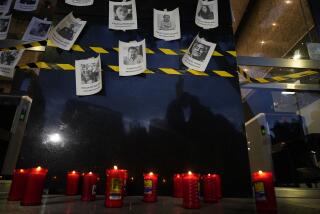U.S. slaps sanctions on Mexican newspaper accused of drug ties
The Treasury Department imposed sanctions Wednesday on a Mexican newspaper for the first time, as well as on one of its owners, for alleged ties to a multimillion-dollar drug-trafficking operation.
Mexican businessman Naim Libien Tella and his Unomasuno newspaper were placed on a U.S. blacklist under a counter-narcotics law known as the Kingpin Act, which freezes the targets’ assets in the U.S. and bars American citizens from doing business with them.
Also sanctioned were a second newspaper, Diario Amanecer, and a small air taxi company based outside Mexico City that are controlled by Libien.
A cartel known as Los Cuinis “has used the Mexican newspaper Unomasuno to further its drug trafficking activities,” John E. Smith, acting director of Treasury’s Office of Foreign Assets Control, said in a statement.
Hundreds of Mexicans and businesses have been placed on the Treasury blacklist, including many suspected traffickers and their associates and families.
Unomasuno was once a preeminent publication, staffed by journalists chafing at government restrictions. It was born in the late 1970s as a flagship for the left and was a precursor to today’s La Jornada, Mexico’s main leftist daily.
Unomasuno fell on hard times amid labor disputes and debt, and ownership eventually was transferred to the Libien family. It is still published but readership has declined, and it has little influence.
Even without readers, newspapers can make money in Mexico from government advertising. It was unclear what role Unomasuno reportedly played in the Cuinis drug-trafficking empire.
In a statement, Libien “vigorously” denied any connection to drug traffickers and invited U.S. officials to examine his businesses. He said his newspaper had been critical of drug cartels.
The Cuinis and its leader, Abigael Gonzalez Valencia, were placed on the U.S. blacklist this year. Gonzalez, who is under a U.S. federal indictment, was captured by Mexican authorities in February and is their custody.
In 2007, he gave Libien power of attorney to control his investment company, the Valgo Group.
The Cuinis are aligned with the Jalisco New Generation Cartel, thought to be the fastest-growing and one of the most aggressively violent criminal organizations in Mexico. It is based around Guadalajara, Mexico’s second city, while Libien is based in Mexico state, which surrounds Mexico City.
Libien, whom Treasury identified as the vice president of Unomasuno, “has had a long relationship with Gonzalez Valencia, who has been involved in drug trafficking since the 1990s,” the Treasury statement said.
U.S. authorities regard the Kingpin Act as a major weapon in the fight against international drug traffickers because sanctions are aimed at the criminals’ money supply.
U.S. citizens who conduct business with blacklisted firms are subject to stiff fines and jail time. But an investigation by The Times in 2011 found that many of the blacklisted companies continued to operate virtually unimpeded.
Special correspondent Cecilia Sanchez in Mexico City contributed to this report.
Follow @TracyKWilkinson
More to Read
Start your day right
Sign up for Essential California for news, features and recommendations from the L.A. Times and beyond in your inbox six days a week.
You may occasionally receive promotional content from the Los Angeles Times.







